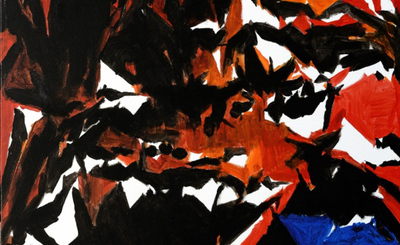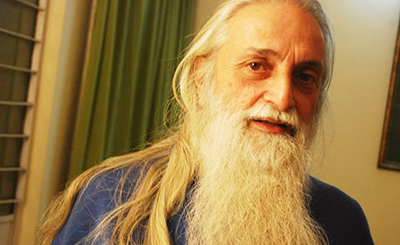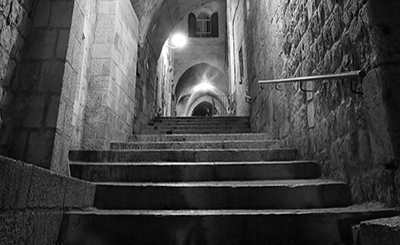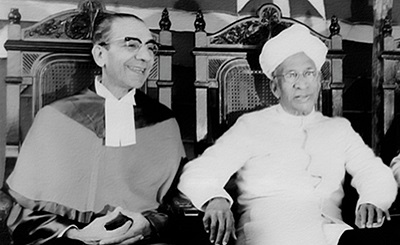
Cactus
Thorns are my language.
I announce my existence
with a bleeding touch.
Once these thorns were flowers.
I loathe lovers who betray.
Poets have abandoned the deserts
to go back to the gardens.
Only camels remain here, and merchants,
who trample my blooms to dust.
One thorn for each rare drop of water.
I don’t tempt butterflies,
no bird sings my praise.
I don’t yield to droughts.
I create another beauty
beyond the moonlight,
this side of dreams,
a sharp, piercing,
parallel language.
A Man With A Door
A man walks with a door
along the city street;
he is looking for its house.
He has dreamt
of his woman, children and friends
coming in through the door.
Now he sees a whole world
passing through this door
of his never-built house:
men, vehicles, trees,
beasts, birds, everything.
And the door, its dream
rising above the earth,
longs to be the golden door of heaven;
imagines clouds, rainbows,
demons, fairies and saints
passing through it.
But it is the owner of hell
who awaits the door.
Now it just yearns
to be its tree, full of foliage
swaying in the breeze,
just to provide some shade
to its homeless hauler.
A man walks with a door
along the city-street
a star walks with him.
The Mad
The mad have no caste
nor religion. They transcend
gender, live outside
ideologies. We do not deserve
their innocence.
Their language is not of dreams
but of another reality. Their love
is moonlight. It overflows
on the full moon day.
Looking up they see
gods we have never heard of. They are
shaking their wings when
we fancy they are
shrugging their shoulders. They hold
even flies have souls
and the green god of grasshoppers
leaps up on thin legs.
At times they see trees bleed, hear
lions roaring from the streets. At times
they watch Heaven gleaming
in a kitten’s eyes, just as
we do. But they alone can hear
ants sing in a chorus.
While patting the air
they are taming a cyclone
over the Mediterranean. With
their heavy tread, they stop
a volcano from erupting.
They have another measure
of time. Our century is
their second. Twenty seconds,
and they reach Christ; six more,
they are with the Buddha.
In a single day, they reach
the big bang at the beginning.
They go on walking restless for,
their earth is boiling still.
The mad are not
mad like us.
To Prolong The Noon
To prolong the noon I sit
sipping beer on this final beach.
The wind and I get a high as we
see in your eyes the glitter
of our first days together.
The sea, endless like death,
Takes no notice.
The refrain of birds above
like a new song earth has learnt.
My childhood is a top that got
buried in the sand even before
it had begun to spin.
Once I heard a tempest’s echoes
in a sparrow’s twitter.
No, we cannot check
this growing chill.
Joy is a goblet
flung into the dark.
And love, a kite
put out among the clouds.
Rain, You
Was it rain
or you?
There were scents:
intense ones,
of the rain-washed earth, of tobacco,
of the acrid sap of the mango-stalk,
of oleander flowers,
of woman’s inner lips.
There were colours,
flying ones,
of the mynah, of the pink balsam,
of collyrium, of wild fire,
of wet yam leaves, of red wine,
of fresh paddy.
There were memories,
unendurable ones,
of the index finger, wet lips,
aroused nipples,
wounds, bells,
irreplaceable hearts.
How many names how many selves
How many places how many births
How many rivers from touches
The mad ecstasy of dreaming of your return
when I lose you
The wild shock of the fear of losing you
when you return.
I have never seen a rain so blue
an embrace so liquid, a dance so irrepressible,
a monsoon kiss that rains so incessantly
like flowers from a gulmohur tree.
Burnt Poems
I am a half-burnt poem.
Yes, you guessed right,
a girl’s love poem.
Girls’ love poems have
Seldom escaped fire:
father’s fire, brother’s fire,
even mother’s, an heirloom.
Only some girls half-escape:
those half-charred ones
we call Sylvia Plath,
Anna Akhmatova
or Kamala Das.
Some girls, to escape fire,
hide their desire
under the veil of piety:
thus is born a Mira,
an Andal, a Mahadevi Akka.
Every nun is a burnt
love-poem, addressed to
the ever-young Jesus.
Rarely, very rarely,
one girl learns to
laugh at the world
with that tender affection
only women are capable of.
Then the world names her
Wislawa Szymborska.
Of course, Sappho:
she was saved only as
her love poems were
addressed to women.
Misplaced Objects
In a flash I recall all the
misplaced objects of my life:
the ten lambent marbles
forgotten under the dry leaves
beneath the mango tree,
the umbrella left behind in Apu’s saloon
the day rain failed to turn up,
the pen that dived from the pocket
while climbing the cashew-nut tree
on the way back from the village school,
the sky-blue shirt remaining
in a hotel wardrobe in Riga,
the long list of books lent, never returned,
some unredeemed debts, a few unrequited loves.
Forgetfulness alone never forgot me.
As I fell in love I began misplacing my heart,
metaphors as I began to scribble poetry.
Later, looking at the hills, I began to feel
the sky had misplaced them and
the clouds had misplaced the rainbow.
I have recently begun to suspect
this very earth with us on it
has been misplaced by God.
In the order He recalls, He claims back:
woods, rivers, us.
(Excerpted from The Missing RIB: Collected Poems, 1973-2015 by K. Satchidanandan, by permission from Poetrywala. Book available on www.paperwall.in)
More from The Byword
Comments
*Comments will be moderated











.jpg)